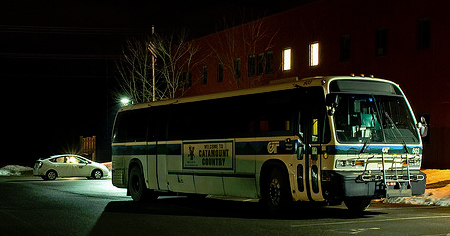
Most of my novel writing recently has been happening on the #86 commuter bus from Richmond to Montpelier and back. The wonderful thing about this is that when I ride, I almost always sit down and start writing immediately, no need for excuses or delays. Sometimes the writing is actual passages of the book, while sometimes it’s story notes, outlining, character exploration, and that kind of thing. Regardless, it’s always building the novel.
At the moment I’m moving scene by scene through a part of the book that is very emotionally draining. Yesterday I wrote a scene where one of my characters is screaming at another in the ruins of their apartment after a terrible tragedy. By the time the bus driver announced “Next stop: Richmond Park and Ride” and slowed down onto the exit ramp, I was practically shaking. I closed the laptop, shoved it in my backpack, and retrieved my lunch bag. As I silently went down the steps to exit the bus, the painful scene still echoing through my brain, and the driver said “Have a great night!”
Writing in public can just be emotionally weird.
Then I went home, where a rabid raccoon was hunched by our back door, near the clothes line. Our neighbors, a very nice couple who both come from farm families and for whom sick animals hold no novelty, had called the police, who in Williston I gather also are responsible for animal control. I first realized the police had arrived when I heard two sharp gunshots from the back yard. I went to the window and saw the officer and my neighbor chasing after the raccoon. It ran out into the middle of our yard, and the police officer shot it again, twice more. It stopped running, but flailed in place, clawing at the places it had been hit. By now, I believe, there were four bullets in the poor thing. After each shot, a faint spray of reddish brown had blown out just past the animal. Regardless, it was still moving.
At the time I thought about turning away, but I’ve gotten in the habit of facing things that scare me. (I’m much worse at facing things that inconvenience me, so I’ve got that to work on.) My son asked me later why I didn’t turn away, and I told him what I just told you. He was shocked and disturbed by it all, but later said he wished he had watched as well, even though I think it would have affected him even more than it did me. Ethan is looking at colleges where he can study animal science. He wants to get a graduate degree in Zoology and eventually work at a zoo.
I remember that back when my son and I volunteered at a raptor rescue center (birds, not dinosaurs) in nearby Shelburne, at first we both had a hard time with the chest freezers full of dead mice, chicks, and rats. We soon became acclimated to it, though, since we had to if we were going to feed the birds. Sometimes we even narrated what the rodents seemed to be saying, frozen in positions that resembled dancing, conversing, or casting an evil spell. I think that might have been a little too acclimated.
Anyway, the raccoon was still not dead. The police officer had to shoot it a fifth time, and again there was the spray in the grass behind it. It still moved, but it seemed weaker now. After another minute or two, it finally stopped moving. While they waited for it to die, my neighbor and the policeman laughed at something one of them had said. I thought about being offended, but the experience was no more novel for either of them than the frozen mice had been for me. At least they weren’t doing funny voices like we had done with the mice.
After the raccoon died, my neighbor got a pitchfork and a plastic bag to take care of the body.
There’s another reason I didn’t look away while the raccoon died, and I didn’t mention it to my son because I was a little embarrassed about it: it’s because I write. I can’t tell you how many deaths I’ve written, but it’s probably hundreds. Meanwhile, I’ve witnessed very few deaths, and I was aware that I might learn something from watching. I took note of the places where the animal looked like it had chewed out some of its fur, of the motions it made after being shot, of the sound of the gun, of how many bullets such a small animal seemed to be able to take. It’s a kind of recycling, taking in old experiences and creating new experiences from them. Does it honor the raccoon more to attentively watch its death and then write about it? Or is it taking advantage, trying to gain something from the animal’s painful and undignified end?
Of course, the raccoon’s real death started when it caught rabies. The policeman was just cutting things short before they got even worse for the creature, not to mention anyone or anything else it might come in contact with. And even if the raccoon knew I was watching, I seriously doubt it cared. Yet I take it as a reminder that writing is a serious business, even when the story is not a serious story. We’re shaping worlds and letting readers into them. What we do to our readers should have a point and a meaning and a purpose. When they come away from watching what it is we give them to see, they should have found a gift hidden in the narrative, something worth having no matter how painful or whimsical or unreal the events in the story may have been.
There’s so much meaningless suffering in the world, a little meaningful suffering–or joy–can go a long way.



